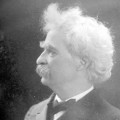Part 2
Parte 2
パート2
파트 2
Parte 2
Bölüm 2
第2部分
In a far country where I once lived the ladies used to go around paying calls, under the humane and kindly pretence of wanting to see each other; and when they returned home, they would cry out with a glad voice, saying, "We made sixteen calls and found fourteen of them out" -not meaning that they found out anything important against the fourteen-no, that was only a colloquial phrase to signify that they were not at home-and their manner of saying it expressed their lively satisfaction in that fact.
|||||||||||||||||||||предлогом|||||||||||||||||||||||||||||||||||||||||||||||коллоквиальный||||||||||||||||||||||
|||||||||||||herum||||||||Vorwand|||||||||||||||||||||||||||||||||||||||||||||||||||||||||||||||||||||
|||||||||||||||visits|||humane|||pretense|||||||||||||||||||||||||||||||||||||||||||||||colloquial||||||||||||||||||lively||||
|||||||||||||||||||||pretexto|||||||||||||||||||||||||||||||||||||||||||||||||||||||||||||||||||||
||||||||||||||відвідувати||||людському|||||||||||||||||кричати||||радістю||||||візити||||||викрикувати|||||||||||||||||розмовний|||значення|||||||||||||||||||
Now their pretence of wanting to see the fourteen-and the other two whom they had been less lucky with-was that commonest and mildest form of lying which is sufficiently described as a deflection from the truth.
||||||||||||||||||||||самой||||||||||||уклонение|||
||||||||||||||||||||||||||||||||||Abweichung|||
||||||||||||||||||||||||mildest||||||||||deflection|||
||||||||||||||||||||||||mais branda|||||||||||||
||претензія||||||||||||||||||||найпоширенішою||||||||||||відхилення|||
Now their pretence of wanting to see the fourteen-and the other two whom they had been less lucky with-was that commonest and mildest form of lying which is sufficiently described as a deflection from the truth.
Is it justifiable?
||оправдано
||gerechtfertigt
||justifiable
||виправдано
Is it justifiable?
Most certainly.
|напевно
Most certainly.
It is beautiful, it is noble; for its object is, not to reap profit, but to convey a pleasure to the sixteen.
||||||||||||Gewinn erzielen|||||||||
||||||||object||||reap||||convey|||||
||||||||||||збирати|||||||||
||||||||||||colher|||||||||
The iron-souled truth-monger would plainly manifest, or even utter the fact that he didn't want to see those people-and he would be an ass, and inflict totally unnecessary pain.
|||||||проявить|||||||||||||||||||осел||нанести|||
||souled||monger||||||||||||||||||||||fool||inflict|||
||de alma||vendedor|||||||||||||||||||||||||||
||||Verbreiter|||||||||||||||||||||||||||
||||||||||||||||||||||||||||завдати|||
||||商人|||||||||||||||||||||||||||
And next, those ladies in that far country-but never mind, they had a thousand pleasant ways of lying, that grew out of gentle impulses, and were a credit to their intelligence and an honor to their hearts.
||||||||||||||||||||||||импульсов|||||||||||||
|||||||||||||||||||||||gentle|||||||||||honor|||
Let the particulars go.
The men in that far country were liars, every one.
Their mere howdy-do was a lie, because they didn't care how you did, except they were undertakers.
|||||||||||||||||гробовщики
|mere|greeting|||||||||||||||undertakers
|||||||||||||||||coveiros
Their mere howdy-do was a lie, because they didn't care how you did, except they were undertakers.
To the ordinary inquirer you lied in return; for you made no conscientious diagnostic of your case, but answered at random, and usually missed it considerably.
|||inquirer|||||||||conscientious|diagnosis||||||||||missed||considerably
||||||||||||сумлінного|||||||||||||значно
To the ordinary inquirer you lied in return; for you made no conscientious diagnostic of your case, but answered at random, and usually missed it considerably.
You lied to the undertaker, and said your health was failing-a wholly commendable lie, since it cost you nothing and pleased the other man.
||||погребальщик||||||||||||||||||||
||||Bestatter||||||||||||||||||||
||||||||||||entirely|commendable|||||||||||
|||||||||||||louvável|||||||||||
||||похоронний агент|||||||||похвальна|||||||||||
You lied to the undertaker, and said your health was failing-a wholly commendable lie, since it cost you nothing and pleased the other man.
If a stranger called and interrupted you, you said with your hearty tongue, "I'm glad to see you," and said with your heartier soul, "I wish you were with the cannibals and it was dinner-time."
||||||||||||||||||||||более искренней|||||||||||||
|||||||||||hearty|||||||||||heartier|||||||||||||
When he went, you said regretfully, "Must you go?"
|||||с сожалением|||
and followed it with a "Call again;" but you did no harm, for you did not deceive anybody nor inflict any hurt, whereas the truth would have made you both unhappy.
||||||||||||||||обмануть||||||||||||||
I think that all this courteous lying is a sweet and loving art, and should be cultivated.
|||||вежливое|||||||||||
|||||courteous|||||||||||
The highest perfection of politeness is only a beautiful edifice, built, from the base to the dome, of graceful and gilded forms of charitable and unselfish lying.
||совершенство||||||||||||||||||||||||
|||||||||edifice|||||||||||gilded|||charitable||selfish|
||||||||||||||||||||dourado||||||
|||||||||будівля||||||||||||||благодійного||не егоїстичного|
What I bemoan is the growing prevalence of the brutal truth.
||оплакиваю||||распространение||||
||beklagen||||Verbreitung||||
||lament||||prevalence||||
||||||поширення||||
||lamento||||||||
Let us do what we can to eradicate it.
|||||||искоренить|
|||||||ausrotten|
|||||||eliminate|
|||||||викорінити|
An injurious truth has no merit over an injurious lie.
|schädliche||||||||
|injurious||||merit||||
|шкідлива||||переваги|||шкідливе|
Neither should ever be uttered.
||||произнесены
||||spoken
The man who speaks an injurious truth lest his soul be not saved if he do otherwise, should reflect that that sort of a soul is not strictly worth saving.
|||||||for fear that|||||||||||consider|||||||||||
|||||||щоб|||||||||інакше|||||||||||||
The man who tells a lie to help a poor devil out of trouble, is one of whom the angels doubtless say, "Lo, here is an heroic soul who casts his own welfare in jeopardy to succor his neighbor's; let us exalt this magnanimous liar."
||||||||||||||||||||||||||||||||||опасности||помочь|||||||великодушный|
||||||||||||||||||||||||||||||||Wohlergehen||Gefahr||Hilfe leisten|||||||großzügigen|
||||||||||devil||||||||||||look||||||||||||jeopardy||succor|||||exalt||magnanimous|
||||||||||||||||||||||見よ||||||||||||||||||||||
||||||||||||||||||||||||||||||||добробут||||порятувати|||||високо||великодушний|
An injurious lie is an uncommendable thing; and so, also, and in the same degree, is an injurious truth-a fact that is recognized by the law of libel.
||||||||||||||||||||||||||||клевета
|||||||||||||||||schädlich|||||||||||Verleumdung
|||||uncommendable|||||||||||||||||||||||libel
|||||непохвальне|||||||||||||||||||||||наклепу

